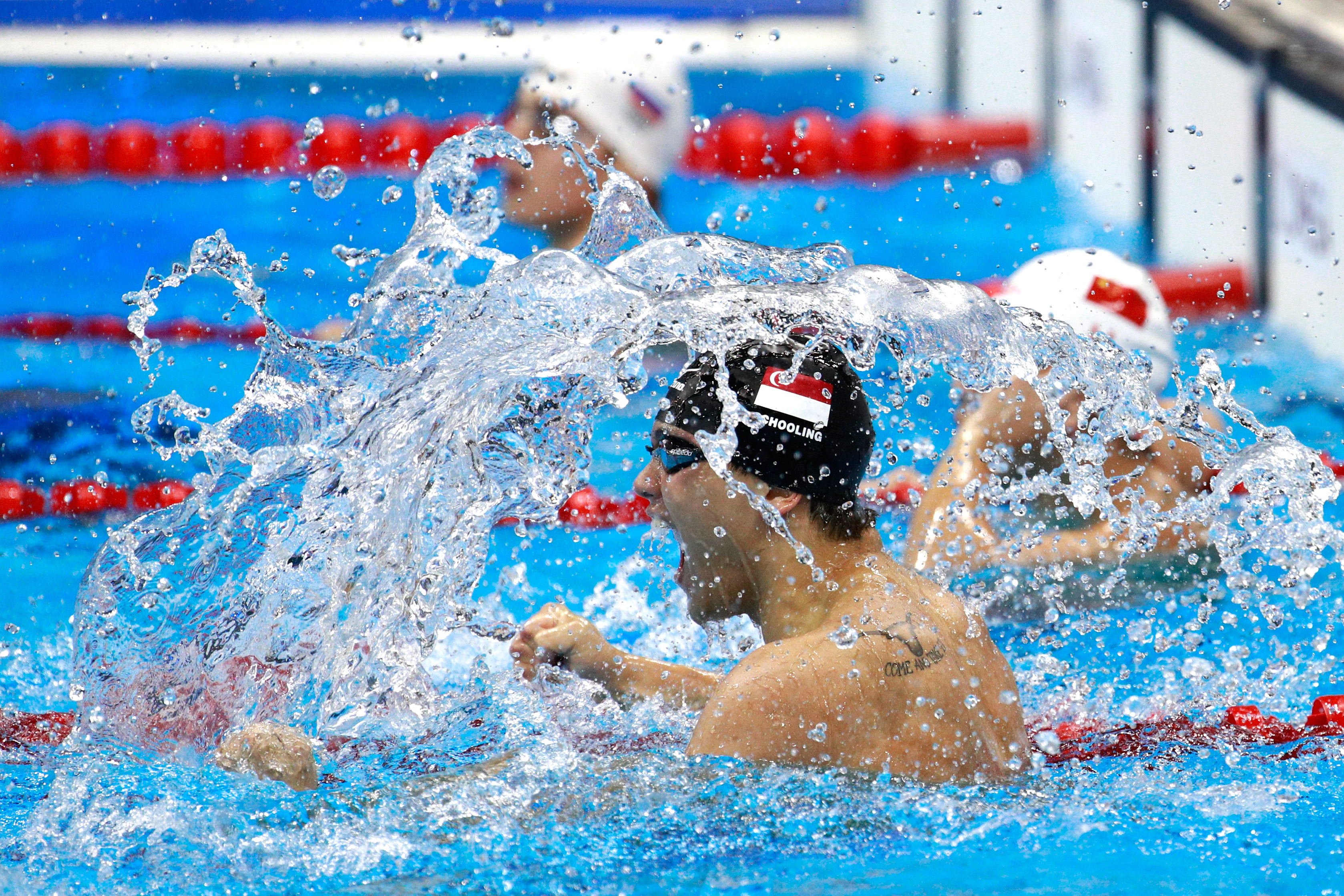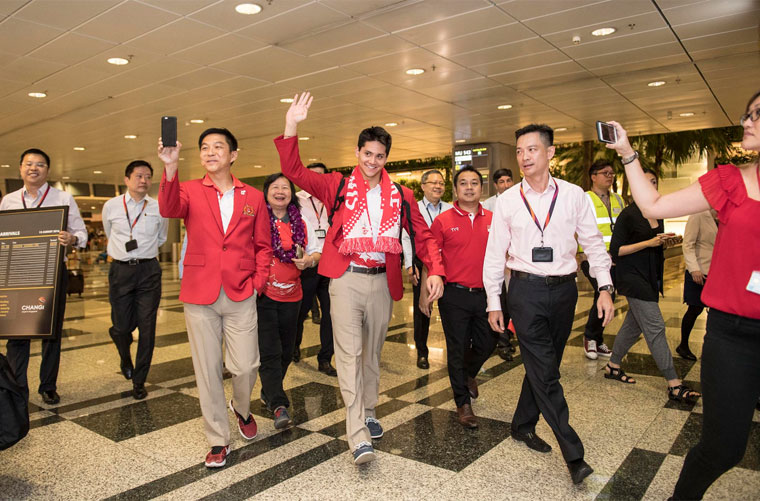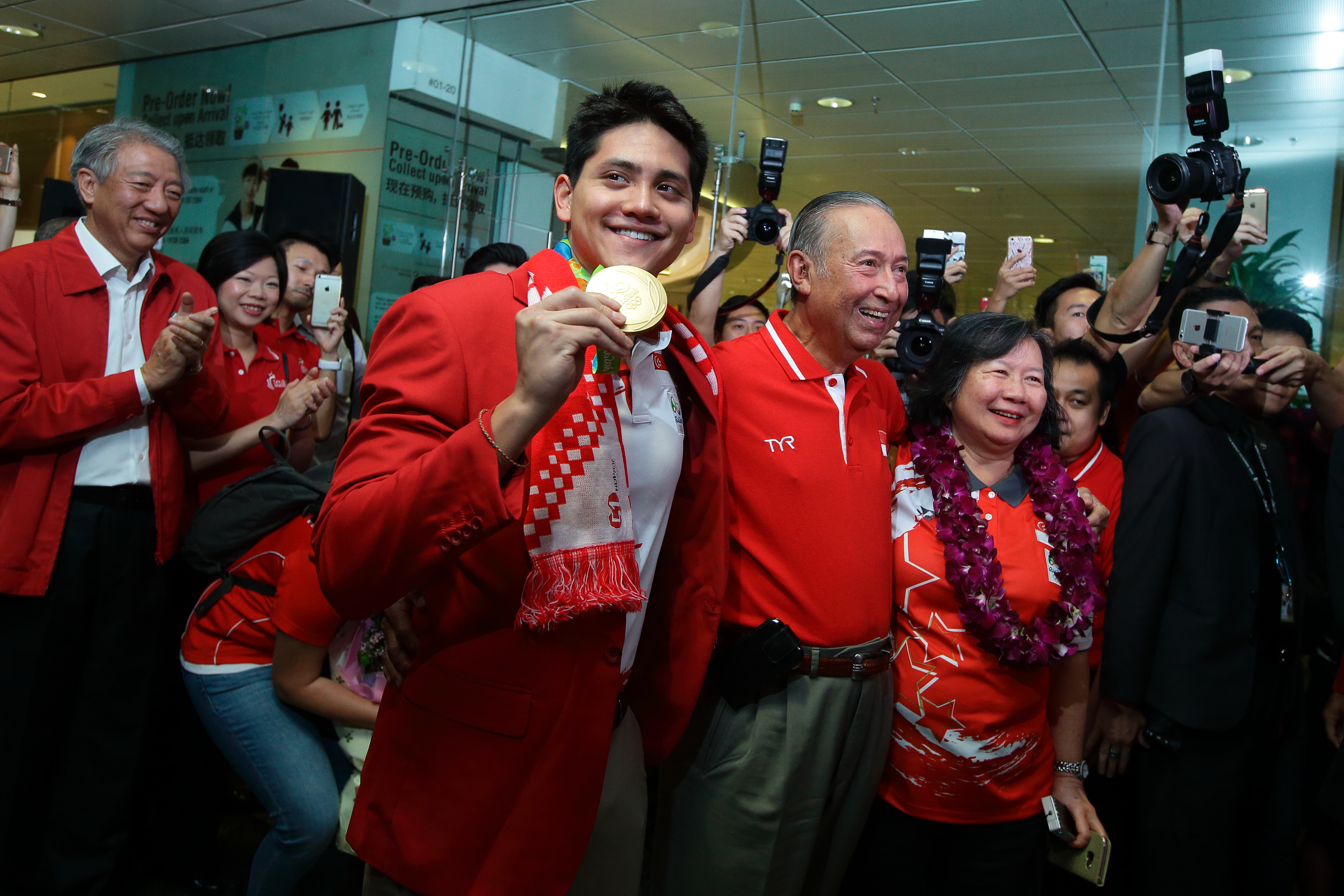For a young country starved of Olympic Games success, Joseph Schooling’s superlative achievement in winning an individual gold medal in the 100m Butterfly event at the Rio Olympics deserves due recognition, including Monday’s unprecedented parliamentary motion formally recognising his achievements.
Schooling’s success demonstrates the audacity of belief and faith, backed by his never-say-die work ethic, and a supportive home environment.
These are salutary learning points -- not so much about his success but rather how the process and the journey to become the world’s best.
It is a story of nurturing the habit to strive to surpass one’s previous best and reach the next pinnacle of excellence.
Schooling's path to success
 Schooling's win is Singapore's first Olympic gold medal in twelve editions of the Olympics Singapore participated in (Photo by Adam Pretty/Getty Images).
Schooling's win is Singapore's first Olympic gold medal in twelve editions of the Olympics Singapore participated in (Photo by Adam Pretty/Getty Images).
Schooling’s path to success has taken a lot of passion, sacrifice, hard work, and dogged belief. His parents, Colin and May, have been instrumental in their son’s pursuit of his dream.
They personally funded their son’s move to the US eight years ago, fully persuaded that it would provide him with the best environment to nurture his talent, reinforce his grit, and strengthen his capacity for hard work. But this entailed Colin and May taking turns to be with Joseph, then only thirteen years of age, in Florida where he attended high school and trained.
Colin and May Schooling are your ideal sports parents. They were prepared to think out of the box, kept pace with the demands of the sport and the needs of the athlete while providing the conducive and loving home environment for the development of a true champion.
"Colin shared with me how his wife and him had meticulously compiled a dossier of their son’s progress, potential and prospects"
When the Defence Ministry announced in 2013 that Joseph had been granted National Service deferment (from 2014 to August 31 2016 in the first instance), Colin shared with me how his wife and him had meticulously compiled a dossier of their son’s progress, potential and prospects as well as detailed plans, training schedules, and targets to demonstrate why NS deferment was justified and how that institutional confidence would be an investment in itself in a Singapore athlete.
The support of Schooling’s parents cannot be under-stated. However, they did not live vicariously through their son but gave him the freedom to chart his sporting destiny.
Before Schooling left for the US in 2009, his father told me that, despite his son’s tender years, training in the US was what he was determined to have as an integral part of his quest to reach his full potential. This was not an audacious quest that was foisted on Joseph by his parents. Having exhausted local options, it was a big step into uncharted waters for the Schoolings but, as a family, they were determined to make it succeed.
There is no automatic success in going abroad to train and study - if only it were that simple. Since the 1980s, there has been a regular stream of our athletes who have gone abroad to train and study. Schooling demonstrates unequivocally that it is how one makes of the opportunity that ultimately matters.
The bottom line is Schooling’s audacity of belief. As sports spectators, we are often more focused on achievements. But the hard work and taking a craftsman-like approach to training and success are often not given the attention they deserve.
Learning points of Schooling's success
Even as we lionise Schooling’s victory, the better learning point to take away is that his passion, belief, and determination to be the best led him to harness his talent and hone his ability. Success is not just predicated on talent; instead, success and hard work go together. Even then, hard work is no guarantee of success.
More importantly, Schooling’ dogged belief and the audacity to pursue what seemed like an impossible target made all the difference. Put it another way, it is about how badly Schooling wants to excel and his work ethic. En route to his title defence at the 2020 Tokyo Olympics, we can be sure that Schooling has his sights on setting new highs, including world records.
What next for Singapore after Schooling's Olympic triumph?
 Photo by Lim Weixiang
Photo by Lim Weixiang
Does Schooling’s Olympic triumph mark a new era for swimming and sports in Singapore? It’s too early to tell.
How can the sports eco-system ride on Schooling’s experience?
Singapore needs to continue to grow a sporting culture that emphasises sports for all as a foundational principle. Sporting excellence is built on our making the most of our limited talent pool. Can we have develop sustainable pathways that would allow our athletes to have competitive sporting careers into their 20s and 30s?
It also takes a community to produce a steady stream of Olympic success stories -- a multi-stakeholder approach. In Schooling’s case, this includes the Ministry of Defence, the Singapore National Olympic Council, Sports SG, the national sport association, the swimming community that Joseph is a part of in Singapore and the United States. Not many athletes have the financial resources that Schoolings’ parents have to fund their sporting dreams.
I hope that Schooling’s success demolishes a psychological barrier in our sports landscape. Otherwise, it might be some time before we produce another Schooling. The fact that Schooling achieved what many of us would not even dare to dream of is proof that Olympic success is not beyond athletes from our city-state.
Jamaica, with a 2.7 million population, has consistently produced many world-class sprinters, including Usain Bolt and Elaine Thompson. Both won the 100 metres sprint events this week at the Olympics. For the amount that Singapore has invested in sports and the infrastructure, the returns could arguably be richer in both quality and quantity.
Sports has come a long way since 1973 when the National Stadium was opened. Sports was then seen as a means to build a healthy and rugged society.
Officiating at the opening of the National Stadium, then Prime Minister Lee Kuan Yew remarked that,
“With a population of just over 2 million, let us not waste time going especially out of our way to produce gold medallists, whether for Olympic, Asian or SEAP games. There are no national benefits from gold medallists for smaller countries. For the super powers, with large populations, superiority in sports is national propaganda to persuade other people of the superiority of their competing political systems. But it is foolish and wasteful for the smaller countries to do this.”
That was a different era when economic priorities were more urgent and demanding for Singapore and the Cold War spawned other proxy wars.
However, sports can bring the nation closer together as Schooling’s triumph and our hosting of and good performance at the SEA Games and Para-Games last year so vividly demonstrated.
What the Singapore sports fraternity makes of and learns from Schooling’s path to success is of utmost importance if we are to nurture more athletes in the years ahead who are not content with following the trail blazed by Schooling but charting new and bold ones of their own.
In his book, The Lights of Singapore, prominent local lawyer Roland Braddell observed of the nascent sporting culture in Singapore: “I know of no sign that points more to a fine future for this town than the new spirit which athletics have introduced”.
This was in 1934.
Fast-forward 80 years on, and we now have an impressive sports infrastructure while the sporting culture is developing slowly but surely.
Eugene K B Tan is associate professor of law at the Singapore Management University. He was team manager of the national swim team at the 2004 Athens Olympics.
Top photo by Suhaimi Abdullah from Getty Images.
If you like what you read, follow us on Facebook and Twitter to get the latest updates.
If you like what you read, follow us on Facebook, Instagram, Twitter and Telegram to get the latest updates.
